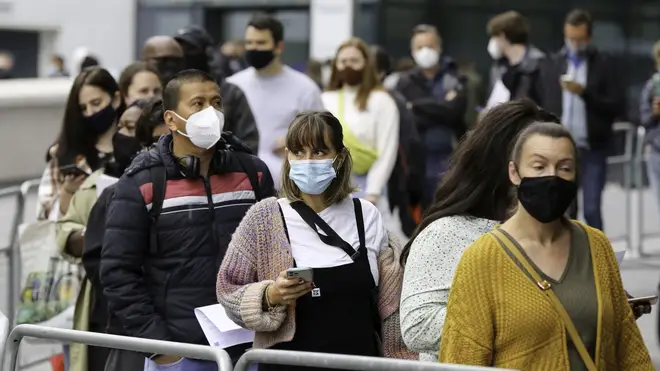
Nick Ferrari 7am - 10am
24 June 2021, 09:29

More than two million adults in England could have suffered with long Covid, according to research.
The REACT-2 study from Imperial College London showed that nearly one-third of people who had Coronavirus had reported symptoms lasting at least 12 weeks.
The findings were based on self-reported data from 508,707 adults who took part in rounds three to five of the study between September 2020 and February.
People reporting symptoms lasting 12 weeks or more fell into two groups, the research found.
One group had severe symptoms, including shortness of breath, a tight chest and chest pain, and the other had common symptoms such as tiredness and muscle aches.
The prevalence of persistent symptoms was linked to age, with a 3.5 per cent increase in risk with each decade of life.
Women, people who are overweight or obese, those who smoke, people who live in deprived areas, or those who had been admitted to hospital are also at a higher risk of experiencing long Covid, it was indicated.
Read more: Long Covid clinics for children offered by NHS England
Read more: 14,000 lives saved and 45,000 hospitalisations prevented by Covid jab rollout

Long Covid sufferer described debilitating effects of illness
Health Secretary Matt Hancock said: "Long Covid can have a lasting and debilitating impact on the lives of those affected.
"Studies like this help us to rapidly build our understanding of the impact of the condition and we are using these findings and other new research to develop support and treatments.
"We are learning more about long Covid all the time and have made £50 million of research funding available to support innovative projects, with clinics established across the country to help improve the treatment available."
Professor Paul Elliott, director of the REACT programme from Imperial’s School of Public Health, said: "Our findings do paint a concerning picture of the longer-term health consequences of Covid-19, which need to be accounted for in policy and planning.
"Long Covid is still poorly understood but we hope through our research that we can contribute to better identification and management of this condition, which our data and others' suggest may ultimately affect millions of people in the UK alone."